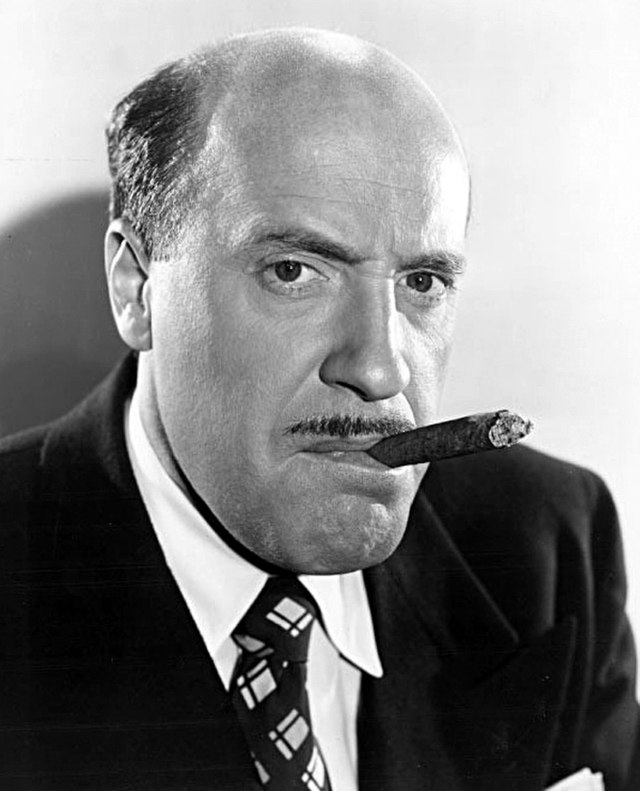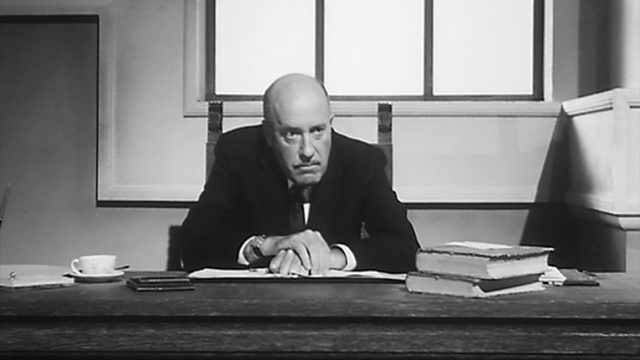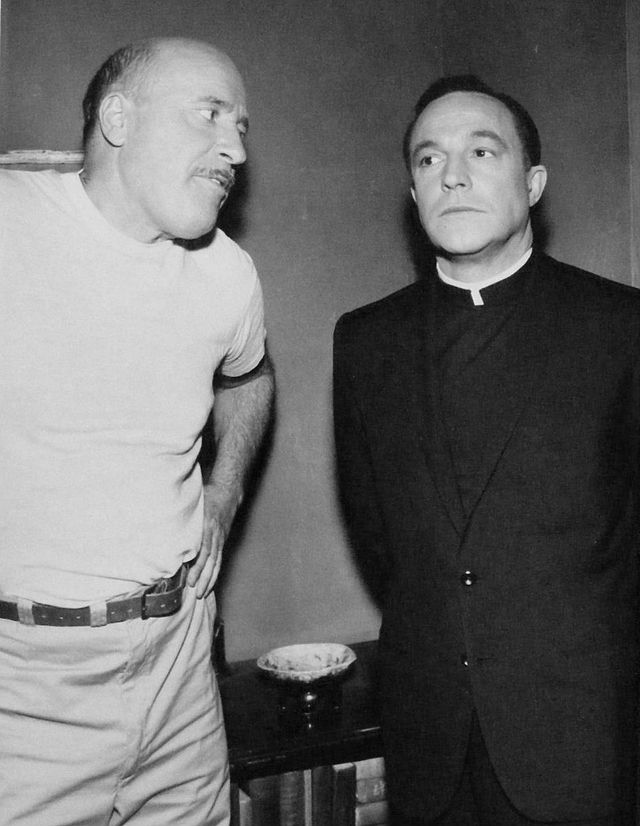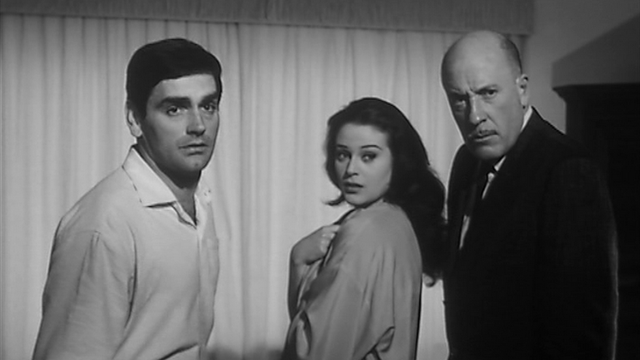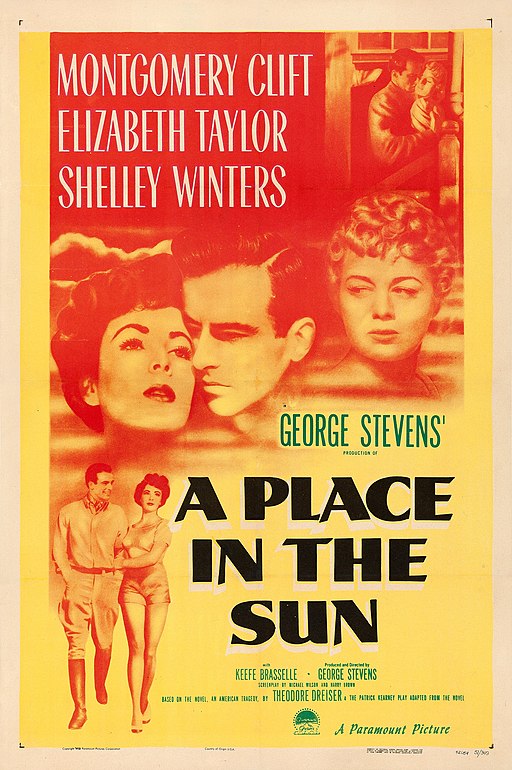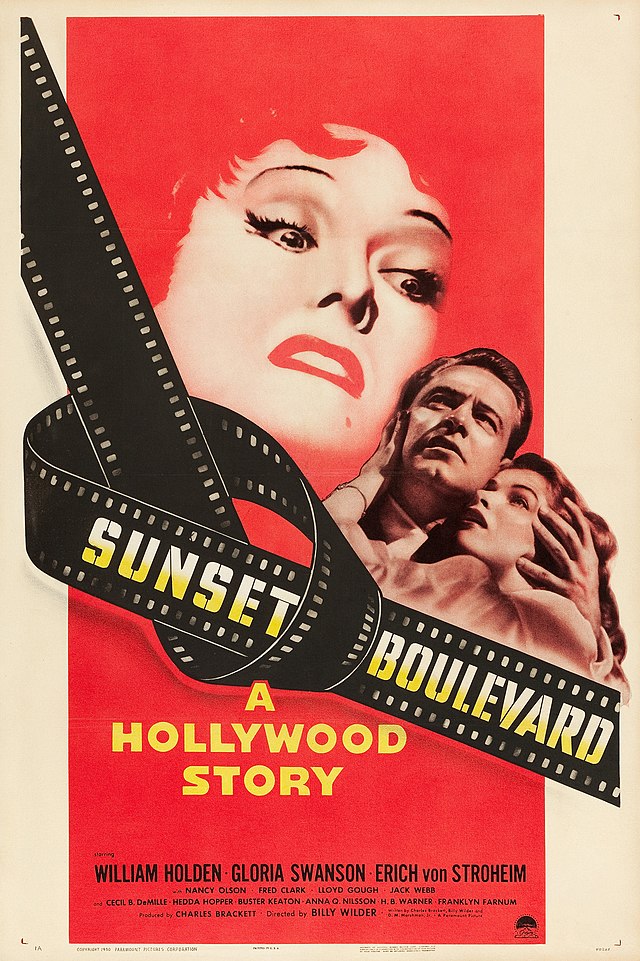Fred Clark
back| Full Name | Frederick Leonard Clark |
| Stage Name | Fred Clark |
| Born | May 19, 1914 |
| Birthplace | Lincoln, California, U.S. |
| Died | December 5, 1968 (aged 54) |
| Buried | Forest Lawn Memorial Park, Glendale, California, U.S. |
| Married to | Benay Venuta (m. 1952–1962; divorced) |
| Children | Stepfather to Benay Venuta's daughter |
| Notable films | Sunset Boulevard (1950) - White Christmas (1954) - How to Marry a Millionaire (1953) - Living It Up (1954) |
Fred Clark
The Master of the Deadpan Glare
Fred Clark (1914–1968) was a distinctive American character actor known for his bald head, arched brows, and dry, exasperated delivery. Born in Lincoln, California, he studied at Stanford and UCLA before serving as a Navy pilot in World War II.
After the war, he transitioned to acting, gaining fame in Sunset Boulevard (1950). He became a Hollywood fixture in comedies like How to Marry a Millionaire and Auntie Mame, often portraying cranky bosses or skeptical authority figures.
Clark also had a strong television presence, appearing in The George Burns and Gracie Allen Show and The Beverly Hillbillies. In 1960, he received a star on the Hollywood Walk of Fame. Married to actress Benay Venuta for a decade, Clark died of liver disease at 54. Though rarely the star, his impeccable timing and memorable persona made him a standout in classic American cinema.
Related
Fred Clark (1914 – 1968)
Biography and Film Career
Fred Clark was one of Hollywood’s most recognizable character actors during the 1950s and 1960s—a man whose balding head, arched brows, and dryly exasperated delivery made him a go-to presence for comic frustration and upper-crust snobbery. But behind that familiar face was a life marked by ambition, discipline, humor, and quiet complexity.
Early Life and Education
Frederick Leonard Clark was born on May 19, 1914, in Lincoln, California, a small town nestled in the Sacramento Valley. From an early age, Clark showed a quick intellect and a particular gift for mimicry and performance. But rather than leap into acting straight away, his early path was grounded in more conventional ambitions.
He enrolled at Stanford University, where he initially pursued pre-law, and later attended the University of California, Los Angeles (UCLA). While at university, he became increasingly drawn to the performing arts. This passion led him to study at the American Academy of Dramatic Arts in New York, where he developed his stage skills and learned the art of dramatic timing—a trait that would become his signature in film and television.
World War II and Military Service
Fred Clark’s career was put on hold by the outbreak of World War II. He joined the United States Navy, where he served with distinction as a pilot. He flew combat missions and eventually rose to the rank of lieutenant commander. His time in the military left him with a lifelong sense of discipline, but it also deepened his desire to pursue acting once the war ended.
Entry Into Show Business
After the war, Clark returned to civilian life and made the fateful decision to chase a full-time acting career. He began with small stage roles and quickly moved into radio, where his expressive voice and dry wit gained attention. Hollywood took notice, and in 1947, he made his film debut in "The Unsuspected." With his stern face and innate comic timing, he quickly became a favorite among casting directors.
Clark’s breakout role came in Billy Wilder’s "Sunset Boulevard" (1950), where he played the skeptical studio executive who turns down Gloria Swanson’s faded star, Norma Desmond. That same year, he appeared in "Riding High" and began a streak of high-profile roles.
Film Success and Signature Roles
Fred Clark carved out a niche in playing impatient bosses, henpecked husbands, condescending authority figures, and stuffy know-it-alls, roles that required a very specific kind of actor—one who could provoke laughter without begging for it.
Throughout the 1950s, he appeared in a string of successful films:
- "How to Marry a Millionaire" (1953), as the pompous suitor of Marilyn Monroe's character
- "Auntie Mame" (1958), as a befuddled member of Mame Dennis’s circle
- "Living It Up" (1954) with Dean Martin and Jerry Lewis
- "The Mating Season" (1951), opposite Gene Tierney and Thelma Ritter
Clark’s screen presence was so reliable that he rarely wanted for work. His face became synonymous with Hollywood satire and high-end farce.
Television Work and Later Career
As the film industry evolved, Clark transitioned seamlessly to television, which expanded his popularity. He had a recurring role on "The George Burns and Gracie Allen Show" as Harry Morton, the cranky neighbor, though he was eventually replaced by Larry Keating. He also made appearances on:
- The Dick Van Dyke Show
- Perry Mason
- The Beverly Hillbillies
- The Addams Family
- Batman (in a humorous villain role)
His last credited film was "The Scorpio Letters" (1967), though he continued television appearances until shortly before his death.
Personal Life and Marriages
In 1952, Fred Clark married Broadway actress and singer Benay Venuta, a well-known figure in New York and Hollywood social circles. The couple became a visible presence at film premieres and charity galas. Though they did not have children together, Clark became stepfather to Venuta’s daughter from a previous marriage.
The marriage was passionate but stormy. Both were strong personalities with busy careers, and in 1962, after a decade together, they divorced. Clark did not remarry.
Despite his sharp on-screen persona, those who knew him personally described him as witty, generous, and deeply private. He preferred quiet gatherings over parties, and he loved literature and jazz music. In interviews, he spoke proudly of his military service and maintained friendships with many fellow veterans in the industry.
Final Years and Death
In the mid-1960s, Fred Clark's health began to decline. He suffered from liver disease, which gradually worsened. Despite his illness, he continued working, a testament to his professionalism and resilience.
On December 5, 1968, Fred Clark passed away at Saint John's Health Center in Santa Monica, California, at the age of 54. His early death shocked many in Hollywood, as he was still in demand and had shown no signs of slowing down in his work ethic.
He was laid to rest at Forest Lawn Memorial Park in Glendale, a resting place for many of Hollywood’s greats.
Legacy
Fred Clark may never have been a leading man, but his contribution to film and television is unmistakable. He brought humor, tension, and color to every scene he entered. As a character actor, he elevated the work of those around him and became one of the most recognizable and dependable faces in mid-century American entertainment.
Audiences may not have always known his name, but they knew that look—the exasperated stare, the arched eyebrow, the perfect deadpan—and they laughed every time.
Height and Body Features
· Height: Approximately 6 feet 1 inch (185 cm)
· Build: Tall and lean, with broad shoulders but a somewhat lanky frame
· Weight: Estimated around 180–190 lbs (82–86 kg) during his prime years
· Hair: Balding from an early age, often completely bald in most roles
· Eyes: Brown
Distinctive Features:
- Prominent arched eyebrows, which enhanced his skeptical or annoyed expressions
- A long, expressive face with sharp cheekbones
- Deep, rich baritone voice, perfect for deadpan delivery
- His posture often emphasized stiffness or rigid formality—well-suited to roles as bosses, generals, or executives
Documentary on Fred Clark
The Art of the Exasperated Everyman: Fred Clark’s Acting Style
Fred Clark didn’t need to raise his voice to command attention on screen. With his bald head, permanently furrowed brow, and rich baritone voice, he could conjure more comedic tension in a sideways glance than some actors could in an entire monologue. While not a leading man, Clark was a character actor par excellence, and his unique acting style became essential to the texture of mid-century Hollywood comedies and dramas alike.
Dry, Deadpan Delivery
At the core of Clark’s style was a razor-sharp deadpan. He had an uncanny ability to deliver lines with dry irony, often letting the absurdity of a situation speak for itself rather than playing it broadly for laughs. Whether he was portraying a suspicious hotel manager, an irate boss, or a skeptical military officer, he would often pause just long enough to let a punchline land with understated precision. His timing was exact but never showy—his laughs came not from exaggeration, but from restraint.
Clark’s deadpan was also a shield—his characters were often unimpressed, world-weary, or condescending, but always with a veneer of authority. He mastered the tone of mock gravity, which made his presence invaluable in farces and satires.
Facial Expression as Weaponry
While his voice was essential to his craft, Clark's face was his secret weapon. His features seemed perpetually arranged in a look of skeptical disbelief or bureaucratic irritation. A simple arch of his thick brows or a pursed-lip grimace could upend a scene, turning even the most mundane line into a moment of comedy or condescension.
He used stillness effectively—where others might flail or gesture, Clark would stand firm, letting his exasperated expressions do the talking. He conveyed volumes with the subtlest shift in his gaze, especially when reacting to other characters' antics. He rarely overplayed his hand, preferring to let the scene come to him.
Typecasting and Mastery of a Persona
Clark was frequently cast as the uptight executive, cranky neighbor, disapproving father, or pompous official—roles that suited his imposing presence and skeptical tone. In less skilled hands, these characters might have been dull or forgettable. But Clark leaned into their pomposity, always hinting at a deeper frustration or personal insecurity behind their rigidity.
Though often typecast, he brought nuance and rhythm to each version of the role. His characters might seem interchangeable at a glance, but they never felt lazy or mechanical. Instead, they were refined variations on a theme—each with a slightly different tempo or edge depending on the scene’s needs.
Supportive but Never Invisible
Fred Clark was the kind of actor directors loved: dependable, scene-stealing when needed, but always in service of the story. He never overshadowed the leads, yet he left audiences remembering his scenes long after the credits rolled. Whether opposite Marilyn Monroe, Dean Martin, or Rosalind Russell, Clark's chemistry with his co-stars helped ground fantastical plots and heighten comic tension.
His knack for playing the foil—the straight-faced counterpart to someone else's chaos—was indispensable. He could be the authority figure that the audience enjoyed seeing flustered or the cynic whose skepticism was ironically justified.
A Touch of Humanity
Though often gruff or sarcastic, Clark never made his characters inhuman. There was often a flicker of vulnerability or bemusement beneath the scowl. In films like How to Marry a Millionaire or The Solid Gold Cadillac, he allowed just enough warmth or befuddlement to slip through to make the audience relate—even when they were laughing at him.
His characters weren’t caricatures; they were archetypes infused with personality. Even when playing a bureaucrat or blowhard, he gave the sense that the man had a backstory, a life off-screen.
Conclusion: A Master of Understatement
Fred Clark was a master of comic understatement, of exasperation refined into an art form. His acting style was built on economy—of gesture, of tone, of presence. He didn't demand attention; he earned it through precision, professionalism, and a deep understanding of human annoyance.
In a time when many actors aimed to be stars, Fred Clark chose instead to be indispensable. And in doing so, he became one of the most enduring character actors of Hollywood’s golden age.
Memorable Movie Quotes by Fred Clark
- "Sunset Boulevard" (1950) – as Sheldrake (Paramount executive):
"We’re not running a cemetery. We're making pictures."
— A classic line reflecting the harsh reality of the movie business, delivered with Clark’s corporate bluntness. - "How to Marry a Millionaire" (1953) – as Waldo Brewster:
"I don’t mind being taken for a ride—once. But this is starting to feel like a world tour!"
— A comedic expression of irritation, typical of Clark’s roles as a befuddled romantic prospect. - "Living It Up" (1954) – as Oliver Stone (newspaper editor):
"I don’t want stories. I want miracles. And they better have headlines."
— Delivered with impatient urgency, showcasing his portrayal of high-pressure authority figures. - "Auntie Mame" (1958) – as Dwight Babcock (bank executor):
"That woman is a menace to moral stability!"
— Said in exasperation about Mame Dennis, perfectly capturing Clark’s role as the conservative foil to the flamboyant heroine. - "Dr. Goldfoot and the Bikini Machine" (1965) – as D.J. Pevney:
"I’ve seen some wild things in this job, but this... this takes the cake, the plate, and the bakery."
— A humorous reaction line from one of Clark’s more over-the-top late-career comedies.
On His Own Career
- "I play men who look like they eat bran flakes without milk—and don’t like it."
— A self-deprecating comment about being typecast as uptight characters. - "Character actors don’t get the girl or the gun. But we get to watch everything go wrong—and comment on it."
— Reflecting his role as the comic observer in many films.
Awards and Recognition
Fred Clark, renowned for his prolific career as a character actor in mid-20th-century American film and television, did not receive major industry awards such as the Academy Awards or Emmy Awards during his lifetime. However, his contributions to the entertainment industry were recognized with a significant honor:
- Hollywood Walk of Fame: On February 8, 1960, Fred Clark was awarded a star on the Hollywood Walk of Fame for his work in television. His star is located at 1711 Vine Street in Hollywood, California.
Fred Clark Movies
1947
- The Unsuspected – Richard Donovan
A film noir where a radio host is implicated in a murder; Clark plays a key supporting role. - Ride the Pink Horse – Frank Hugo
A war veteran seeks justice in a small town; Clark portrays a local figure entangled in the mystery.
1948
- Fury at Furnace Creek – Bird
Two brothers investigate their father's dishonorable discharge; Clark plays a supporting character. - Hazard – Lonnie Burns
A woman addicted to gambling gets into trouble; Clark appears as a character involved in the gambling world. - Two Guys from Texas – Dr. Straeger
A musical comedy about two entertainers; Clark plays a doctor. - Cry of the City – Lt. Collins
A police lieutenant pursues a childhood friend turned criminal; Clark plays the determined lieutenant.
1949
- Alias Nick Beal – Frankie Faulkner
A district attorney makes a Faustian bargain; Clark plays an associate of the mysterious Nick Beal. - The Younger Brothers – Daniel Ryckman
Outlaws seek redemption; Clark portrays a lawman. - Flamingo Road – Doc Waterson
A carnival dancer becomes involved in small-town politics; Clark plays the town doctor. - White Heat – The Trader (Winston)
A psychotic gangster's story; Clark plays a fence for stolen goods. - So You Want to Get Rich Quick (Short) – Fastidious Ferguson (uncredited)
A comedic short about get-rich-quick schemes; Clark has a brief role. - So You Want to Be an Actor (Short) – Mr. Frisbee (uncredited)
A humorous take on aspiring actors; Clark appears briefly. - The Lady Takes a Sailor – Victor Santell (uncredited)
A woman encounters a mysterious man; Clark has a minor role.
1950
- Return of the Frontiersman – Ryan
A sheriff's son is accused of murder; Clark plays a townsman. - The Eagle and the Hawk – Basil Danzeeger
A tale of revenge and justice; Clark portrays a supporting character. - Sunset Boulevard – Sheldrake
An aging silent-film star dreams of a comeback; Clark plays a studio executive. - The Jackpot – Mr. Andrew J. Woodruff
A man wins a radio contest with unexpected consequences; Clark plays his boss. - Mrs. O'Malley and Mr. Malone – Tim Marino
A mystery-comedy involving a murder on a train; Clark plays a suspect.
1951
- The Lemon Drop Kid – Moose Moran
A con artist tries to repay a debt by organizing a charity; Clark plays a gangster. - A Place in the Sun – Bellows
A man is torn between two women; Clark portrays a defense attorney. - Hollywood Story – Sam Collyer
A producer investigates an old murder case; Clark plays a studio executive. - Meet Me After the Show – Timothy 'Tim' Wayne
A musical about a Broadway star's romantic entanglements; Clark plays her manager.
1952
- Three for Bedroom "C" – Johnny Pizer
A comedy set on a train; Clark plays a traveling salesman. - Dreamboat – Sam Levitt
A college professor's past as a silent film star is revealed; Clark plays a studio head.
1953
- The Stars Are Singing – McDougall
A musical about an immigrant girl; Clark plays a theater manager. - The Caddy – Mr. Baxter / Old Skinhead
A comedy about a golfer and his caddy; Clark plays a golf official. - Here Come the Girls – Harry Fraser
A musical comedy set in the 1900s; Clark plays a theater producer. - How to Marry a Millionaire – Waldo Brewster
Three women seek wealthy husbands; Clark plays a wealthy suitor.
1954
- Living It Up – Oliver Stone
A man believes he's dying and gets a taste of the high life; Clark plays a newspaper editor.
1955
- Abbott and Costello Meet the Keystone Kops – Joseph Gorman / Sergei Toumanoff
A comedy involving stolen film footage; Clark plays the villain. - Daddy Long Legs – Griggs
A wealthy man sponsors an orphan's education; Clark plays his assistant. - How to Be Very, Very Popular – B.J. Marshall
Two showgirls hide out in a college; Clark plays the college dean. - The Court-Martial of Billy Mitchell – Col. Moreland
A dramatization of a real-life military trial; Clark plays a prosecuting officer.
1956
- Miracle in the Rain – Steven Jalonik
A romantic drama set during WWII; Clark plays a co-worker. - The Birds and the Bees – Horace Hamilton
A con artist falls for a wealthy heiress; Clark plays her father. - The Solid Gold Cadillac – Clifford Snell
A woman challenges corporate corruption; Clark plays a board member. - Back from Eternity – Crimp
Survivors of a plane crash face dangers in the jungle; Clark plays a passenger.
1957
- Joe Butterfly – Col. E.E. Fuller
A comedy set in post-WWII Japan; Clark plays a colonel. - The Fuzzy Pink Nightgown – Police Sergeant McBride
A movie star is kidnapped; Clark plays a police sergeant. - Don't Go Near the Water – Lt. Cmdr. Clinton T. Nash
A satire about Navy public relations officers; Clark plays their superior.
1958
- Mardi Gras – Al Curtis
A musical romance set during Mardi Gras; Clark plays a promoter. - Auntie Mame – Dwight Babcock
An eccentric woman raises her nephew; Clark plays a conservative trustee.
1959
- The Mating Game – Oliver Kelsey
An IRS agent audits a rural family; Clark plays a government official. - It Started with a Kiss – Maj. Gen. Tim O'Connell
A newlywed couple navigates military life; Clark plays a general.
1960
- Visit to a Small Planet – Maj. Roger Putnam Spelding
An alien visits Earth; Clark plays a military officer. - Bells Are Ringing – Larry Hastings
A woman runs an answering service and falls for a client; Clark plays a playwright. - The Passionate Thief – L'americano
A comedy about a New Year's Eve adventure; Clark plays an American tourist.
1961
- La moglie di mio marito – Mr. Bietti
An Italian comedy; Clark plays a businessman. - A porte chiuse – Xatis, il procuratore generale
A courtroom drama; Clark plays the prosecutor.
1962
- Boys' Night Out – Mr. Bohannon
Men rent an apartment for extramarital affairs; Clark plays a boss. - Hemingway's Adventures of a Young Man – Mr. Turner
A young man's journey during the Great Depression; Clark plays a mentor. - Zotz! – Gen. Bullivar
A professor discovers a magical coin; Clark plays a military officer.
1963
- Move Over, Darling – Mr. Codd (Hotel Manager)
A presumed-dead wife returns to find her husband remarried; Clark plays the hotel manager caught in the ensuing confusion. - Young Girls of Good Families – Mr. Whitehall
A romantic comedy involving mistaken identities; Clark portrays a concerned father figure.
1964
- The Curse of the Mummy's Tomb – Alexander King
An American showman exploits a mummy's tomb, unleashing a deadly curse; Clark plays the ambitious promoter.
1965
- John Goldfarb, Please Come Home! – Heinous Overreach
A satire where a former football star becomes entangled in Middle Eastern politics; Clark plays a government official. - Sergeant Deadhead – General Rufus Fogg
A military experiment causes a private to switch personalities; Clark portrays the befuddled general. - When the Boys Meet the Girls – Bill Dennis
A musical comedy about college life and romance; Clark plays the father of the female lead. - Dr. Goldfoot and the Bikini Machine – D.J. Pevney
A mad scientist creates female robots to seduce and rob wealthy men; Clark plays a skeptical government agent. - War Italian Style – General Zacharias
An Italian comedy involving two bumbling soldiers; Clark appears as a high-ranking officer.
1968
- Eve – John Burke
An explorer searches for a lost city in the Amazon and encounters a mysterious woman; Clark plays a member of the expedition. - Skidoo – Tower Guard
A retired gangster is called back into service; Clark has a cameo as a prison tower guard. - The Horse in the Gray Flannel Suit – Tom Dugan
A man uses his daughter's horse to promote a product; Clark plays an advertising executive. - I Sailed to Tahiti with an All Girl Crew – "Generous" Josh
A man attempts to win a yacht race with an all-female crew; Clark portrays a rival sailor.
1971
- Eddie (TV Movie) – Chief Pike
A television movie about a young man's journey; Clark plays the police chief.

